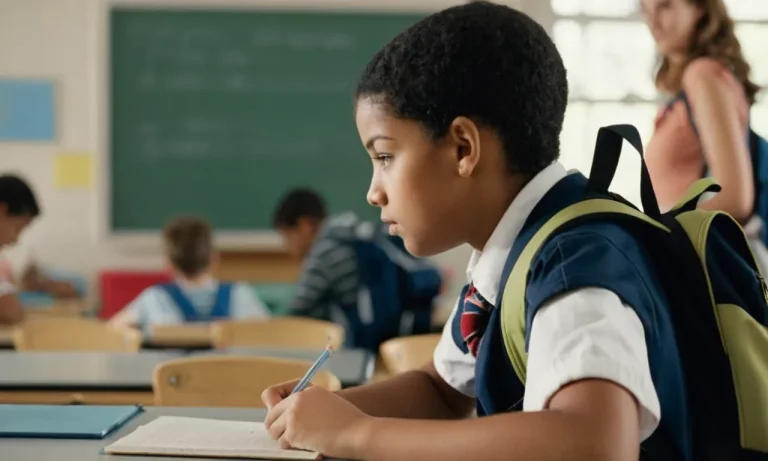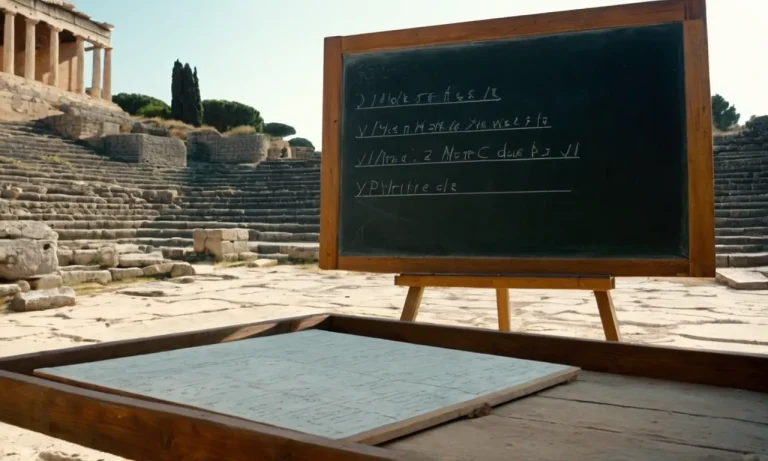As the crisp autumn air sets in and the leaves begin to change color, many students and parents find themselves wondering about an age-old question: Do we get Columbus Day off school? This national holiday, celebrated annually on the second Monday of October, has been a source of debate and discussion for years.
If you’re short on time, here’s a quick answer to your question: The observance of Columbus Day as a school holiday varies across different states, school districts, and educational institutions. While some schools and districts close for the day, others remain open and conduct classes as usual.
In this comprehensive article, we’ll delve into the history and significance of Columbus Day, explore the reasons behind its observance (or lack thereof) in schools, and provide insights into the ongoing discussions surrounding this holiday.
We’ll also examine the alternatives and initiatives that have emerged in recent years, reflecting the evolving perspectives on this controversial commemoration.
The History and Significance of Columbus Day
The Origins of Columbus Day
Columbus Day, celebrated annually on the second Monday of October, has its roots dating back to the late 18th century. It commemorates the arrival of Christopher Columbus in the Americas on October 12, 1492.
While the idea of honoring Columbus was initially proposed in the late 1700s, it wasn’t until 1892 that President Benjamin Harrison declared a one-time national celebration to mark the 400th anniversary of Columbus’s voyage.
The first official Columbus Day celebration took place in New York City in 1892, with a grand parade and various festivities. Over the years, more states began recognizing the holiday, and in 1937, President Franklin D. Roosevelt officially designated October 12th as Columbus Day, a national holiday.
Celebrating the Arrival of Christopher Columbus
For many years, Columbus Day was celebrated as a day to honor the Italian explorer’s accomplishments and the beginning of European exploration and colonization in the Americas. Parades, school programs, and community events were organized to commemorate this historic event.
In some cities with large Italian-American populations, such as New York and San Francisco, Columbus Day celebrations were particularly grand, with elaborate parades and festivities. According to the U.S. Census Bureau, as of 2022, there are approximately 16.8 million people of Italian descent in the United States, making up about 5.2% of the total population.
😊
The Controversy Surrounding Columbus Day
However, in recent decades, Columbus Day has become increasingly controversial, with many calling for the holiday to be abolished or renamed. Critics argue that celebrating Columbus perpetuates the glorification of colonialism and the mistreatment of indigenous peoples.
They point to the well-documented atrocities committed by Columbus and his crew against the Native Americans they encountered, including enslavement, violence, and the spread of diseases that decimated entire populations.
As a result, several states and cities have replaced Columbus Day with alternative holidays or celebrations that honor indigenous peoples and their cultures. For example, as of 2022, at least 14 states and over 130 cities have officially recognized Indigenous Peoples’ Day instead of Columbus Day.
This shift reflects a growing awareness and recognition of the complex and often painful history of European colonization in the Americas. 👏
Ultimately, the debate surrounding Columbus Day highlights the ongoing discussions and reevaluations of historical narratives and their implications for modern society. As our understanding of history evolves, so too does the way we commemorate and interpret significant events and figures from the past.
Columbus Day School Closures: A State-by-State Overview
Ah, Columbus Day – a day that sparks joy in the hearts of students and bewilderment in the minds of parents. But do we really get the day off from school? The answer, my friends, is a resounding “it depends!”
🤷♀️ Let’s dive into the nitty-gritty of this controversial holiday and its impact on the education system across the United States.
States that Observe Columbus Day as a School Holiday
- In many states, including New York, New Jersey, and Massachusetts, Columbus Day is observed as a public holiday, and schools are closed for the day. This means that students get a well-deserved break from their studies, and teachers can indulge in a little extra R&R. 😎
- According to a 2022 Education Week report, approximately 21 states officially observe Columbus Day as a school holiday. However, it’s important to note that some districts within these states may choose to remain open, so it’s always a good idea to check with your local school district.
States that Do Not Observe Columbus Day in Schools
- On the flip side, there are several states that have chosen not to observe Columbus Day as a school holiday. In states like California, Tennessee, and Virginia, it’s business as usual on the second Monday of October, with students and teachers reporting to class as usual.
- Some states have even gone a step further and replaced Columbus Day with alternative holidays or observances, such as Indigenous Peoples’ Day or Native American Day. These states aim to honor and celebrate the rich cultural heritage of the Native American communities that have called this land home for centuries.
The Role of Local School Districts and Policies
While state laws provide a general framework for observing holidays, the decision to close schools on Columbus Day often falls on individual school districts. Many districts have their own policies and calendars that determine which holidays are observed, and some may even allow parents or students to take an excused absence for cultural or religious observances.
So, do you get Columbus Day off from school? The answer is as varied as the states themselves. Whether you’re lounging on the couch or hitting the books, one thing is certain: the debate surrounding this holiday is far from over.
But hey, at least you now have a comprehensive guide to navigate the maze of Columbus Day school closures! 🎉
The Ongoing Debate: Perspectives and Alternatives
Indigenous Peoples’ Perspectives and Concerns
For many indigenous communities, Columbus Day is a painful reminder of the colonization, genocide, and cultural erasure that followed the arrival of European explorers in the Americas. According to the Smithsonian National Museum of the American Indian, the holiday perpetuates a narrative that disregards the rich histories and vibrant cultures of Native peoples who inhabited these lands for thousands of years before 1492.
Indigenous activists and scholars argue that celebrating Columbus reinforces harmful stereotypes and ignores the atrocities committed against their ancestors. They advocate for a more honest and inclusive representation of history that acknowledges the resilience and ongoing struggles of Native populations.
Some statistics from the National Coalition Against Domestic Violence:
- Native American women face murder rates that are more than 10 times the national average 😔
- Over 84% of Native American women have experienced violence in their lifetime 😢
- Nearly 40% of Native American women are victims of intimate partner violence 😔
These staggering figures highlight the ongoing challenges faced by indigenous communities, underscoring the need for greater awareness and action. 🙏
Calls for Renaming or Replacing Columbus Day
In response to these concerns, there have been growing calls to rename or replace Columbus Day with a holiday that better reflects the values of inclusivity and respect for all cultures. Many states and cities across the US have opted to celebrate Indigenous Peoples’ Day instead, honoring the rich heritage and resilience of Native American communities.
As of 2022, 14 states and over 130 cities have officially recognized Indigenous Peoples’ Day, with more jurisdictions considering similar measures. Proponents argue that this shift not only acknowledges the painful legacy of colonization but also celebrates the diversity and contributions of Native peoples to modern society.
👏
Initiatives for Inclusive and Accurate Historical Representation
Beyond the debate surrounding Columbus Day, there is a broader push for more accurate and inclusive representations of history in education and public discourse. Organizations like the Zinn Education Project and the Learning for Justice (formerly Teaching Tolerance) provide resources and professional development opportunities for educators to teach a more comprehensive and nuanced understanding of historical events.
These initiatives aim to challenge dominant narratives, amplify marginalized voices, and foster critical thinking skills among students. By acknowledging and addressing the limitations and biases of traditional history curricula, we can cultivate a more informed and empathetic society that celebrates diversity and promotes mutual understanding.
Isn’t that awesome? 😍
Planning Ahead: Tips for Parents and Students
Checking School Calendars and Policies
When it comes to Columbus Day, it’s essential for parents and students to stay informed about their school’s calendar and policies. Many schools have different approaches to this federal holiday, with some opting for a day off, while others continue with regular classes.
To avoid any confusion, it’s advisable to check your school district’s website or contact the administration directly. Reputable sources like GreatSchools.org can also provide insights into specific school calendars and holiday observances.
Preparing for Potential Assignments or Makeup Work
Even if your school observes Columbus Day as a holiday, it’s wise to stay ahead of the curve. Teachers may assign homework or projects to be completed during the break. Proactive communication with instructors can help you understand their expectations and plan accordingly. Don’t be caught off guard!
According to a recent survey by Education Week, nearly 60% of teachers assign work during extended breaks, ensuring that students remain engaged and on track.
Exploring Educational Opportunities on Columbus Day
While some may view Columbus Day as a day off from school, it can also present an opportunity for learning and exploration. Many museums, historical sites, and cultural centers offer special programs or discounted admission rates on this day.
For example, the National Park Service often hosts educational events and activities at their locations, providing a hands-on learning experience for families. Why not turn Columbus Day into a fun and educational adventure? 😎
Additionally, parents can use this day to engage their children in educational activities at home. From reading books about explorers and history to conducting science experiments or visiting virtual museums online, the possibilities are endless.
Remember, learning doesn’t have to be confined to the classroom walls. 🎓
By planning ahead and staying informed, parents and students can make the most of Columbus Day, whether it’s a day off or a regular school day. Embrace the opportunity to learn, explore, and create lasting memories together.
After all, education is a lifelong journey, and every day presents a chance to grow and discover something new. 🌟
Conclusion
The observance of Columbus Day as a school holiday remains a complex and multifaceted issue, reflecting the diverse perspectives and ongoing discussions surrounding this commemoration. While some states and school districts continue to observe the holiday by closing schools, others have chosen to remain open or explore alternative approaches.
As we navigate this evolving landscape, it is essential to approach the topic with sensitivity, respect, and a commitment to accurate historical representation. By fostering open dialogue, embracing diverse viewpoints, and prioritizing inclusive education, we can work towards a more nuanced understanding of our shared history and its impact on various communities.
Ultimately, whether schools choose to observe Columbus Day or not, the decision should be guided by a genuine desire to promote understanding, foster critical thinking, and create an environment where all students feel valued and represented.
By engaging in thoughtful discussions and remaining open to change, we can collectively shape a more inclusive and equitable future for our educational institutions and society as a whole.






